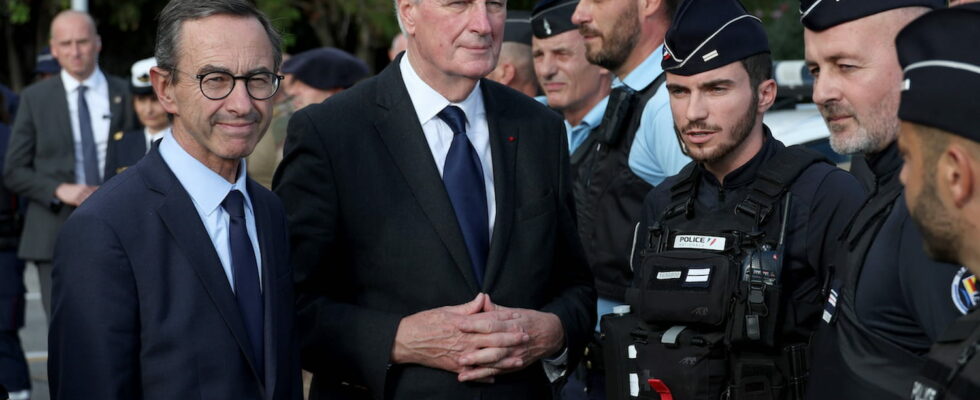The government spokesperson confirmed Thursday morning that Beauvau would consider entering into agreements with non-EU countries to return certain foreigners who are impossible to deport to their country of origin.
“It is a desire which is carried by the Minister of the Interior, Bruno Retailleau”, replied Thursday, October 17 in the morning, on the airwaves of Sud Radio, the spokesperson of the government Maud Bregeon when she was questioned on the possibility that France could sign agreements similar to the one which now links Rome and Tirana. Since October 16, it has allowed Italy to send asylum seekers arrested in its waters to Albania. “In any case, it is being studied by the Ministry of the Interior,” she explained, before adding: “We are not stopping ourselves from doing so.”
A declaration which set fire to the powder in part of Macronie. Some people do not really share this vision of immigration management. “We discover things in the press, we are not received at Place Beauvau to discuss with the minister. All this is not correct and clearly, Michel Barnier agrees”, lamented to BFMTV the Renaissance deputy and rapporteur of the latest immigration law which had already shaken the political class last December. And Ludovic Mendes gets even more annoyed: “And now we discover that we want to send asylum seekers outside the European Union, for example to Iraq? We are really walking on our heads!”
During a press conference from Menton this Friday, the Prime Minister however tempered: “I do not believe that this example [de l’Italie et l’Albanie ndlr.] be transposable […] for legal and institutional reasons.” In fact, an alternative would rather be considered.
Several agreements already under negotiation
As pointed out Opinionalthough some are expressing their astonishment today, this measure was nevertheless mentioned by the Minister of the Interior in his first speech to the prefects, on October 8. “Several agreements are already being negotiated by the Directorate General for Foreigners in France and must be finalized, which concern in particular Rwanda, Burundi, Kazakhstan, Iraq and Egypt,” revealed Bruno Retailleau.
The objective of this measure? Allow a prefect to be able, for example, to remove an Afghan illegal alien whose profile would be, according to the terms used, “suggestive of disturbances to public order”, whereas to date, Paris cannot carry out such a removal , due to lack of relations with the Taliban regime and airlines serving the destination from the European Union. Based on the principle that many Afghans pass through Kazakhstan before arriving in France, the idea would therefore be to send such profiles back to this country, undoubtedly subject to cooperation agreements with it, such as the training of security forces. local, or economic, order, with perhaps more visas granted to its nationals to come and work in Europe. It is then up to the receiving country to manage the individual deemed undesirable by Paris. Afghan, Russian, Syrian… Everyone could be sent back to an appropriate country.
A new immigration law “at the start of 2025”
The controversy arises when almost a year after the fiasco of the immigration law, which had fractured the majority in the Assembly, the government spokesperson revealed on October 13 that the executive intended to propose a new immigration law “at the beginning of 2025”. Traveling to the Franco-Italian border this Friday, Michel Barnier defended this project, pointing out that for the European asylum and immigration pact to be applied in France, “there must be transposition into French law”. “That alone justifies a new law on immigration,” he said, as relayed by franceinfo, suggesting, however, that other measures could, on occasion, be slipped into the text.
In Bruno Retailleau’s entourage, we want to believe that “Michel Barnier puts [simplement] the subject of immigration at the top of the pile of its concerns, like the French”, reports BFMTV. While even within the Macronie dissonant voices are heard, like that of the former Prime Minister Gabriel Attal , which considers the project “not a priority”, a recent Odoxa-Backbone Consulting survey for Le Figaro seems rather to go in the direction of Beauvau. The bill would today be described as “necessary” by nearly seven out of ten French people (71%). A little more than half of the French people surveyed (57%) would consider it “effective” in improving the current situation.
